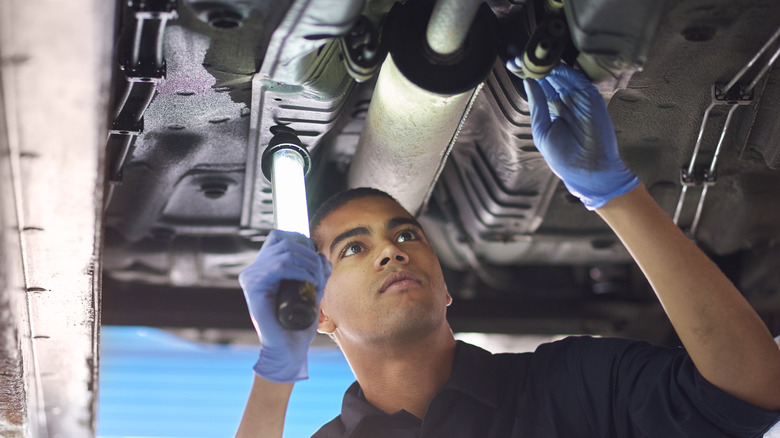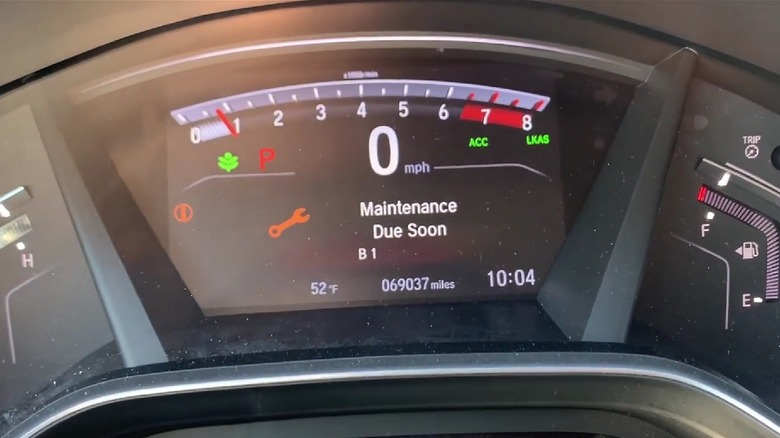What Is Honda B1 Service And Is It Necessary?
Regular vehicle maintenance is crucial to avoid costly breakdowns, extend the car's life, and helps it hold value if you decide to trade it in or sell it. Automakers have long been implementing diagnostic systems into their cars and trucks to help remind drivers to service them. The Honda B1 Service is a message that displays on the instrument cluster indicating the vehicle needs an oil change, a tire rotation, and several inspections to ensure components like the brakes, gearbox, suspension, exhaust, and fuel system are working optimally.
However, some driver's question the dealership's motives, as many official service centers charge more than a local mechanic. Whatever your feelings are toward dealership service departments, you should never skip an oil change in your car, otherwise you could be setting yourself up for a wallet-busting repair bill. While the B1 message is unique to Honda, there are several common dashboard warning lights you should be able to identify for proper care and maintenance of your vehicle.
Are dealers overcharging for basic maintenance?
An issue some Honda owners have with the B1 Service is that it can be too expensive. One Civic owner explained on Reddit, "[The dealership] charges $160 for [oil change and tire rotation] because they are also clocking time doing a bunch of other work like cleaning the brake pads and inspecting this and that. Why would I pay $160 for an oil change?" The average cost of an oil change varies depending on the type of oil used, but shouldn't run more than $125 with full-synthetic.
Proper tire alignment and rotation is so important for several reasons, including safety. According to RepairPal, on average, a tire rotation runs somewhere around $35 to $45 in price. With the above estimate of $125 for an oil change using the most expensive type of oil and the highest end of the average tire rotation cost, it totals $170. However, in addition to these services, Honda technicians also go down a lengthy checklist of other major vehicle systems to help head-off any minor issues before they worsen.
A Honda technician of two years responded to concerns around service costs and explained, "I don't know if they are adding old services that you missed and just want them done now. If you just keep up with the basic maintenance schedule you should be ok. I have Honda's and just do the recommended maintenance and all [is] good."
Are automakers maintenance schedules too aggressive?
The Honda Maintenance Minder (which includes the B1 Service indicator) will display a B1 Service alert every 5,000 to 7,500 miles or six months, whichever comes first. According to AAA, today's engine oil performs well up to 5,000 or even 7,500 miles, with synthetic options upwards of 10,000 miles before needing to be changed. Per Consumer Reports, drivers should rotate their tires every 5,000 to 8,000 miles. In terms of checking fluids, FitMyCar recommends twice a year for transmission and coolant, and more regularly for brake fluid. The B1 Service from Honda isn't any more aggressive than the general recommendations for car maintenance.
However, dealership service departments do attempt to upsell additional maintenance products. One previous dealership technician confided to Edmunds that there may be some disingenuous recommendations made to vehicle owners in an attempt to make more profit. This ex-technician explained, "The dealer might recommend changing the transmission fluid every 12,000 miles, whereas the manual recommends changing it every 60,000 miles. If you followed the dealer's recommendation, that means you'd have four transmission fluid changes that were unnecessary."
He also stated, "Almost no one reads their owner's manual so they really don't know what's best for their car. See, the manual was written by the company that built your car. It is the most accurate description of how to care for it." While not every dealership operates this way, the one's that do certainly explain the distrust some owners have toward official automaker service departments.


